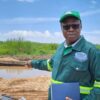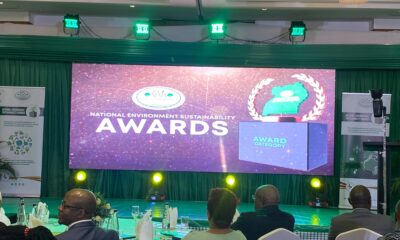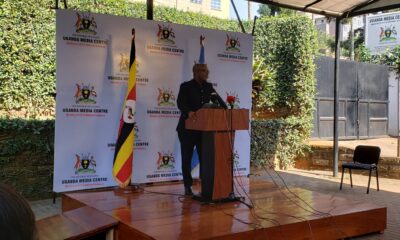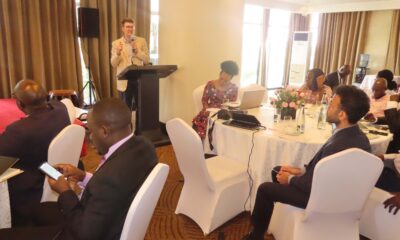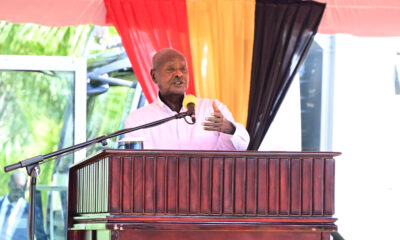Environment
NEMA calls for immediate action as plastic waste chokes Uganda’s environment
The Executive Director of the National Environment Management Authority (NEMA), Akankwasah Barirega has highlighted the grave environmental and health risks posed by plastic pollution in Uganda.
Speaking during the World Environment Day celebrations at the Kololo Ceremonial Grounds in Kampala today, Barirega stressed the urgent need for drastic action to address the country’s growing plastic waste crisis.
He noted that currently, the world generates a staggering 430 metric tons of plastics per year. Shockingly, two-thirds of this production consists of single-use plastics, which are used once and then discarded.
Barirega explained that such unsustainable consumption habits have led to a dire situation, with plastic pollution projected to contribute to 19% of greenhouse gas emissions permissible under the 1.5-degree Celsius scenario by 2040.
This alarming trend puts the goal of limiting global temperature increase to 1.5 degrees Celsius above pre-industrial levels at risk.
The economic and societal costs associated with plastic pollution are also substantial. Barirega highlighted research estimates, which indicate that the annual social and environmental costs related to plastic pollution exceed a staggering $600 billion.
These costs represent the conflict between the profits accrued by the plastic industry and the burdens borne by society as a whole, particularly vulnerable populations in the developing world.
“These lawsuits express the tension between different parts of our society based on the profits received by the plastic industry and the costs borne by all of us in society, most especially the vulnerable people in the developing world,” said Barirega.
Warning of potential consequences, Barirega cautioned Uganda’s plastic manufacturers that if civil suits akin to those seen in developed nations were to be introduced in the country, the profitability of the plastic industry would be severely compromised.
He revealed that Uganda has produced 12,330 metric tons of PET plastics since 2018. In the Kampala metropolitan area alone, over 135 tons of plastic waste is generated annually, with a concerning 42% of this waste remaining uncollected, leading to environmental contamination.
Barirega underlined the hazardous impact of open-air burning of plastics, revealing that approximately 21 tons of plastics are burned in this manner.
“This practice poses severe health risks to the population.” Additionally, 47 tons of collected plastic waste end up in landfills, while 27,160 tons are left on land. Shockingly, 13,580 tons of plastic waste find their way into Uganda’s water systems, with 10% of uncollected plastics flowing into rivers and lakes, exacerbating the problem of unexplained flooding.
During the celebrations organized by NEMA and presided over by Prime Minister Robinah Nabbanja on behalf of the President, Barirega said that the detrimental effects of plastic pollution extend beyond the environment and deep into human health.
He cited research findings that demonstrate the presence of microplastics in human blood and breast milk, raising concerns about the long-term impact on human well-being. Also, plastics contribute to poor air quality, reduced soil fertility, contamination of water bodies, and the deaths of livestock, fish, and wildlife through ingestion and entanglement.
Barirega emphasized that plastic pollution also intensifies the already dire situation regarding greenhouse gas emissions.
To fight the plastic pollution crisis, Barirega outlined three key principles: reuse, recycle, and reorient and diversify. He stressed the urgent need to transition from a throwaway economy to a reuse society by accelerating the reuse of plastic products, noting that this approach could reduce plastic pollution by 30% by 2040.
The Executive Director also noted the importance of promoting recycling, as it could potentially decrease plastic pollution by 20% by 2040. He called for reorienting the market toward plastic alternatives, such as paper bags, glass bottles, and fabric cloth.
Meanwhile, Barirega noted NEMA’s efforts to promote sustainable environmental practices through the suspension of permits for wetland usage since September 2021 and the requirement for tree planting as a condition for approval of linear infrastructure and buildings.
NEMA also mandated the installation of air quality monitors in all factories to enhance self-regulation and control air pollution. The authority has introduced administrative fines for environmental breaches and remains committed to raising awareness, prosecuting offenders, and automating business processes for sustainable development assessments.
Despite these achievements, Barirega told the chief guest that significant challenges persist, including limited capacity in terms of personnel, equipment, and financing for both NEMA and other relevant agencies. He highlighted the shortage of staff within the National Forest Authority (NFA), which manages 506 officially gazetted central forest reserves, emphasizing the need to address this capacity gap for effective forest protection.
In his message read by Rt Hon Nabbanja, the President called for promotion of local alternatives to the use of plastics like packing matrials made out of papyrus reeds, banana leaves and fibre among others.
“These environmentally friendly paper bags can replace kaveera. The use of alternative fuels will help stop encroachment on our forest reserves for wood fuel,” said the President.
He added that his government is committed to promoting the use of electricity, solar energy and bio gas. It will also double the efforts to educate Ugandans on how to take care of the environment.
“However, these efforts must be complimented by the eradication of poverty at the household level which is often a trigger for environmental degradation. The people must be taught how to take care of the environment, but also how to take care of themselves and their families,” he added.
Today’s event was organized by NEMA together with Uganda Biodiversity Fund. Several people showcased their environmentally sustainable projects especially, alternatives to plastic products which remain a big challenge to the country.




